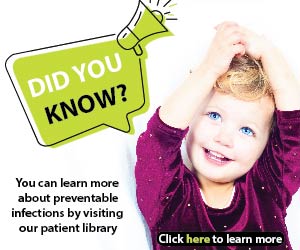An ounce of prevention...
-320x247.jpg)
Sherry and her family had been looking forward to their Caribbean holiday for months. When they finally arrived, the first thing they did was stop for a bite to eat and some lemonade. The next day, the family was preparing to go sightseeing, and that’s when it hit. Sherry started having stomach cramps and sweating profusely, and the next thing she knew she was running to the bathroom every 10 minutes with diarrhea.
A reported 98% of travellers will make a food or drink error within the first few days of arriving at a foreign destination.1 And that can result in traveller’s diarrhea – most often caused by consuming food or water contaminated with bacteria called enterotoxigenic E. coli (ETEC). Germs that cause traveller’s diarrhea can also be transmitted from person to person (including restaurant food handlers) due to poor hygiene.2
The Centers for Disease Control (CDC) estimates that 30% to 70% of visitors to a tropical region will have at least one episode of diarrhea.2 And while it usually resolves on its own within 3 to 5 days, traveller’s diarrhea – often associated with fever, nausea, vomiting, bloating, and abdominal cramping, as well as loose, watery stools3 – has ruined many a vacation.
Preventive measures may be recommended for some people heading to tropical destinations, including the Caribbean. The oral 2-dose vaccine, Dukoral, approved by Health Canada, offers some protection against traveller’s diarrhea and cholera, also marked by diarrhea.3 The young, the elderly, and people with chronic health conditions are at increased risk of these [and other] infections, and may suffer more serious consequences if they become ill.4
Overall, a bit of planning and prevention can help ensure healthy travels. A sensible first step is to consult your physician or travel clinic at least 6 weeks in advance, to make sure you have all the vaccinations you need for your destination and planned activities.4
Measles, a potentially serious and highly contagious disease, is a growing concern both at home and abroad. The World Health Organization (WHO) has reported outbreaks in numerous travel destinations including Brazil and India, and smaller flare-ups in France, Israel and Italy. The CDC advises international travelers to be fully vaccinated against measles at least two weeks before you depart – or failing that, to have at least one dose of MMR (measles-mumps-rubella) vaccine.5
Other vaccine considerations – especially for travel to tropical areas such as the Caribbean – include hepatitis A and typhoid, which are also transmitted by contaminated food and water. And adventuresome individuals who may get a tattoo to commemorate their holiday, or be exploring caves or places inhabited by bats, may benefit from vaccination to protect against hepatitis B, rabies, and Yellow Fever.5
Planned destinations and activities should be discussed with a physician or travel clinic advisor. While there are no vaccines to protect against Zika virus and malaria, these mosquito-borne illnesses are concerns in many tropical regions. Take along protective clothing (i.e. light-coloured, loose clothing that covers arms and legs), hats, closed-toe footwear, and approved insect repellent.6 And don’t forget to pack other essentials such as sunscreen and alcohol-based hand sanitizer4 in case soap and clean water are not available.
Regardless of their destination, travellers are advised to ensure that they are up to date with routine immunizations vaccines. In addition to MMR, these include diphtheria-tetanus-pertussis vaccine; varicella (chickenpox) vaccine; polio vaccine; and the yearly flu shot.5
Brought to you by Vaccines411.ca – know where to go for your vaccinations.
This information should not be used as a substitute for the medical care and advice of your doctor. There may be variations in treatment that your physician may recommend based on individual facts and circumstances.
Read more Vaccines411® Articles 
Sources
Note: the hyperlinks that direct to other sites are not continuously updated. It is possible that some links become untraceable over time. Thank you.
- Factsheet: travel vaccines – enterically borne
http://www.bcpeds.ca/uploadfiles/documents/npfv/Travel_Vaccines.pdf - Travelers' Diarrhea
https://wwwnc.cdc.gov/travel/yellowbook/2020/preparing-international-travelers/travelers-diarrhea - Traveller's Diarrhea and Cholera Vaccine
https://www.healthlinkbc.ca/healthlinkbc-files/travellers-diarrhea-cholera-vaccine - Travellers' diarrhea
https://www.canada.ca/en/public-health/services/diseases/diarrhea.html - Zika virus: Advice for travellers
https://travel.gc.ca/travelling/health-safety/travel-health-notices/152



